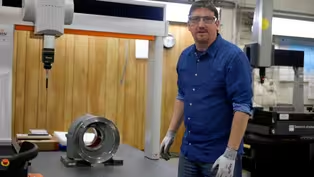Careers that Work
Engineer
Season 1 Episode 8 | 3m 48sVideo has Closed Captions
Meet Robert Slusher, a design engineer for Flowserve Corporation
Robert Slusher walks us through a day in the life of an engineer, what to expect from the career, what education and training is necessary, and more.
Problems playing video? | Closed Captioning Feedback
Problems playing video? | Closed Captioning Feedback
Careers that Work is a local public television program presented by WVIA
Careers that Work
Engineer
Season 1 Episode 8 | 3m 48sVideo has Closed Captions
Robert Slusher walks us through a day in the life of an engineer, what to expect from the career, what education and training is necessary, and more.
Problems playing video? | Closed Captioning Feedback
How to Watch Careers that Work
Careers that Work is available to stream on pbs.org and the free PBS App, available on iPhone, Apple TV, Android TV, Android smartphones, Amazon Fire TV, Amazon Fire Tablet, Roku, Samsung Smart TV, and Vizio.
Providing Support for PBS.org
Learn Moreabout PBS online sponsorship(upbeat music) - Hi, my name's Robert Slusher.
I'm a design engineer at the Flowserve corporation.
(upbeat music) Engineers are problem solvers.
That's essentially what an engineer is.
Now, I design pump parts, but there are many different kinds of engineers.
They're electrical engineers, nuclear engineers, chemical engineers, biological engineers.
And what we do is essentially someone will give you a problem and it's your job using math, science, physics you know, chemistry to fix these problems.
Without engineers, most things wouldn't exist.
You wouldn't have cars, planes, trains, you wouldn't be watching this video because the camera that it's being shot on was engineered by someone.
Someone had to come up with how this thing works.
So engineering is a very versatile field that as long as you have the right education and the drive to do, anyone can do it.
(upbeat music) Day to day, I do the design operations for aftermarket pumps.
These are old pumps that customers want upgraded to do new things.
A lot of times the parts manufacturing centers, local shops will call and say, "Well, how does this thing work?
How are we supposed to put this groove in there?"
And I am the one that they call, you know and we're the ones, we're the problem solvers.
40% of my day is spent dealing with manufacturing issues.
The other 60% is dealing with the local personnel on site and designing new applications and new parts for pumps.
(upbeat music) So what does it take to be an engineer?
I think it takes somebody who has an inquisitive mind and has an open mind, think outside the box.
Sometimes there's multiple answers to the same question.
It's all about how you reach it.
Find the most efficient answer based on your calculations and verify those calculations.
And typically the best answer is the shortest answer.
Generally when you're first outta school, you're still inexperienced.
So you're probably looking around $40,000 a year to start.
And you know, it'll be an entry level position but it's not a bad thing because once you get enough experience and understand the industry, depending on what you design, you have to understand the product and understand the design.
So you're not gonna get that right away.
It might take years to understand.
As you grow up in your engineering, you know, career, you might go from $40,000, the first couple years to $80,000 in five years, if you prove yourself as a capable and good engineer, essentially.
And after that, the sky's the limit.
You can be engineering manager.
You can be a director, you can be a CEO.
I mean, you can move on 'cause you know the product.
I have a family, I have two daughters, Lily and Maddy.
And I spend lots of time with the family.
You know, me and the kids are out outside a lot, playing baseball, we go fishing a lot.
An engineer can make an impact in the world more than you think they can, just because things exist and work.
Nobody really thinks about how it works.
Like why is electricity?
Why do you have lights?
You know, why do we have cars that go, you know, how does a gas pump work?
So at the end of the day with engineering, I think that you know, the things that I'm creating is making the world a better place.
These pumps that we are designing and putting together for our customers will one day make electricity.
They'll provide drinking water to millions of people.
We will provide gasoline, diesel fuel, fuel for power plants, cars, trucks, boats.
We make the world a better place through our designs.
As long as we're capable in our designs, these things are what make the world work.
We're behind the scenes, pulling the strings.
So it makes me feel really good to be able to make the world a better place and use my talents to produce things that other people can use and truly enjoy.
(upbeat music)
Video has Closed Captions
Clip: S1 Ep8 | 3m 58s | Conozca a Robert Slusher, ingeniero de diseño de Flowserve Corporation (3m 58s)
Providing Support for PBS.org
Learn Moreabout PBS online sponsorship

- Home and How To

Hit the road in a classic car for a tour through Great Britain with two antiques experts.












Support for PBS provided by:
Careers that Work is a local public television program presented by WVIA

